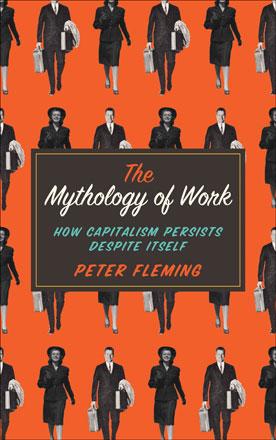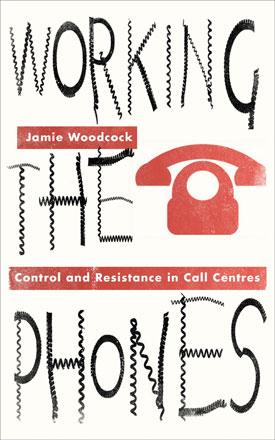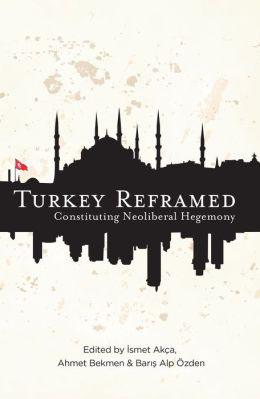You are here
‘You are your job — 24/7’
By Sally Bland - Jun 21,2015 - Last updated at Jun 21,2015

The Mythology of Work: How Capitalism Persists Despite Itself
Peter Fleming
London: Pluto Press, 2015
Pp. 215
Using psychology, philosophy, political theory and up-to-date research, Peter Fleming questions why work has become such an overwhelming part of 21st century life, even as less work is required for human survival. Technology should have shortened working hours, but the opposite has occurred. “Smart phones and laptops mean that we are always contactable and this facilitates the creeping encroachment of work over our lives.” Yet, surveys reveal that “only about 13 per cent of the global work force considered themselves ‘engaged’ by their jobs,” with the rest feeling deeply alienated. (p. 3)
Fleming links this discrepancy to neoliberal capitalist conditions — stagnating real wages, rising housing costs, aggressive taxation of working people, the state’s withdrawal from providing public services and the resulting accumulation of personal debt. In his view, employees work not to survive but to subsidise the existence of the rich, sometimes called the 1 per cent, who benefit from tax breaks and workers’ indebtedness.
“This is the irony of state-sponsored shareholder capitalism. It is the workers — via tax — who are the true investors. But that investment is immediately expropriated to bankroll the neoliberal war machine, confer costly assistance to large multinational firms free of charge, and pay for the expensive mistakes made by incompetent government bureaucrats…” (p. 17)
A background check of top government and business leaders dispels the myth that they hold their positions due to special skills that would justify their excessive earnings, which can reach 143 times the average wage of their employees.
New ideology and management forms have evolved to keep people working more than they need to, as “neoliberalism aims to enlist the entire subjective personality of the worker”. Fleming terms this the “I, Job” function: “You are your job — 24/7” (p. 56)
Thus, work becomes what we are rather than what we do. The boundaries between work time and free time are erased, creating a total system from which there seems to be no escape. Moreover, “creativity and innovation are successfully wedded to self-exploitation,” with detrimental effects on both. (p. 8)
With trade unions mostly disabled, workers’ status is increasingly precarious: they work longer hours for less money and can be easily fired, abandoned by the firm and the state. Since their identity and self-worth is totally tied to their job, their insecure status has high social costs, such as mental and physical illnesses, increased use of stimulants, work-related deaths and suicides.
Fleming dissects managerialism, which is not actually about getting the work done better, but about controlling the work force, often at the expense of productivity and safety, of which he gives some horrifying examples. He also analyses how the deregulation and subcontracting practiced in neoliberalism means that firms are not accountable for the damage inflicted on employees or the environment. In a particularly incisive chapter entitled “Corporate Ideology as False Truth Telling,” he shows how big businesses have recalibrated their PR to deflect criticism of the human and environmental damage their activities cause. By telling partial truths, they avoid broader, more damning critique.
The analysis is enlivened by references to many other scholars’ ideas as well as to movies and other elements of popular culture. As a professor of business and society at City University London, Fleming is well placed to describe how the neoliberal agenda impacts on higher education.
Fleming’s motivation for mercilessly critiquing the existing state of affairs is conviction that humans could be living much better lives. Throughout his logic-driven analysis, he queries what can be done. This is not an easy question as neoliberalism’s structure precludes most forms of labour struggle used in the past, but in the conclusion, he sets out some bold proposals that would indeed reverse the useless misery of the present system.
While Fleming’s point of departure is the situation prevailing in the UK, US and other advanced countries, his concern is worldwide: “it is the Global South that bears the horrific brunt of neoliberal global governance policies, especially children…” (p. 148)
Related Articles
Working the Phones: Control and Resistance in Call CentresJamie WoodcockLondon: Pluto Press, 2017Pp.
Economics After Capitalism: A Guide to the Ruins and a Road to the FutureDerek WallLondon: Pluto Books, 2015Pp.
The rise to power of the AKP (Justice and Development Party), which had its origins in the Islamist movement, initially elicited much speculation about whether Islam is compatible with democracy.



















